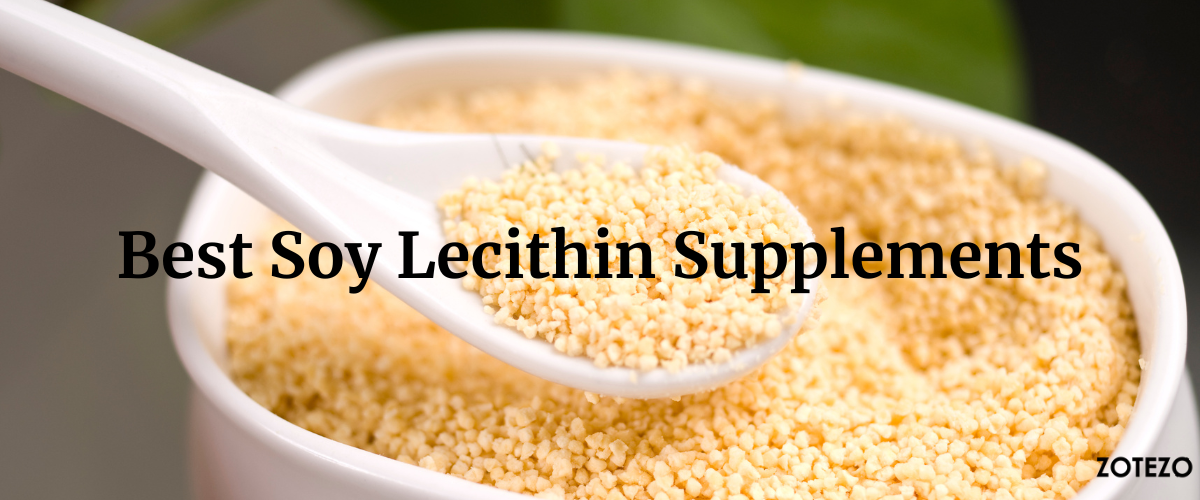Introduction
Are you looking to improve the health of your body and mind while also filling yourself with energy? If so, soy lecithin supplements may be just what you’re looking for. Soy lecithin is a naturally occurring phospholipid that can help provide essential nutrients, support cell regeneration, and repair, boost metabolism, improve digestion and absorption of dietary elements, and even reduce inflammation. For these reasons, many people opt for soy lecithin supplementation as part of their everyday diet regimen.
But, with so many options flooding the market, it can take time to choose the best one that fulfills your ideal requirements. You may be in confusion wondering about below questions:
1. Which Soy Lecithin Supplement is good?
2. What are its benefits or side effects?
3. What to look for while buying a Soy Lecithin Supplement?
Don’t worry; we have got you covered. We will explain everything you need to know about soy lecithin supplements, including their potential benefits, side effects, and more! Read on to learn how supplemental Soy Lecithins might be the perfect daily addition to help you look better and feel better!

Find The Best around the world
Australia
Canada
France
Germany
India
Italy
Japan
Netherlands
Singapore
Spain
Sweden
UAE
UK
USA
Tips for choosing the right Soy Lecithin for you
When choosing a soy lecithin supplement, it is essential to consider the following factors:
Purity
Look for supplements made from non-GMO soybeans and free of pesticides and other contaminants.
Dosage
Choose a supplement with the appropriate dosage for your needs. The recommended daily dosage for soy lecithin is between 1,200 mg and 3,600 mg.
Brand reputation
Look for supplements from reputable companies that have been in the business for a long time.
Allergen
If you are allergic to soy, you should avoid soy lecithin supplements and choose a different source of lecithin, such as sunflower lecithin.
Check for additional ingredients.
Some soy lecithin supplements may contain additional ingredients that adversely affect your health.
Consult your healthcare provider
Before taking any supplements, it is always best to consult your healthcare provider to ensure that it is safe for you and that they will not interact with any medications you are currently taking.
Benefits of using Soy Lecithin
Soy lecithin supplements are believed to have several potential health benefits, including:
Improving cardiovascular health
Soy lecithin contains phosphatidylcholine, which may help lower cholesterol and triglyceride levels in the blood, thus reducing the risk of heart disease.
Supporting cognitive health
Some studies have suggested that soy lecithin may help improve memory and cognitive function.
Reducing inflammation
Some preliminary research suggests that soy lecithin may have anti-inflammatory properties and help reduce symptoms of osteoarthritis.
Supporting liver health
Soy lecithin may help protect the liver from damage and support its ability to detoxify the body.
Improving skin health
Soy lecithin may improve the skin’s barrier function, which can help reduce dryness and improve overall skin health.
It’s important to note that more research is needed to fully understand the potential benefits of soy lecithin supplements and establish recommended dosages. Consult with a healthcare professional before taking any supplement.
Types of Soy Lecithin Supplements
Soy lecithin supplements are available in several forms, including:
Capsules
Soy lecithin is available in capsule form, which is easy to take and allows for accurate dosing.
Liquid
Some soy lecithin supplements are liquid, which the body may absorb more easily.
Powder
Soy lecithin powder can be added to food or drinks, making it a versatile supplement.
Gummies
Some supplement manufacturers offer gummies that contain soy lecithin, making them a convenient and tasty way to consume the supplement.
Softgels
Softgel forms of soy lecithin supplements are also available in the market, and it’s a more solid form than liquid form.
It’s important to note that these supplements may vary in their composition, purity, and dosage. Always read the label and consult a healthcare professional before taking any supplement.
Side-effects of using Soy Lecithin Supplements
Soy lecithin supplements are generally considered safe for most people when taken in the recommended dosage. However, some people may experience side effects such as:
Digestive issues
Some people may experience stomach upset, diarrhea, or other digestive discomforts when taking soy lecithin supplements.
Allergic reactions
People allergic to soy may experience allergic reactions such as hives, itching, or difficulty breathing when taking soy lecithin supplements.
Interactions with medications
Soy lecithin supplements may interact with certain medications, such as blood thinners, which can increase the risk of bleeding.
Diarrhea
Too much lecithin can cause diarrhea, a side effect of supplementing with high doses of lecithin.
Headaches
Some people may experience headaches or migraines from taking soy lecithin supplements.
It’s essential to keep in mind that these side effects are not typical and may vary from person to person. Before taking any supplement, it is always best to consult with a healthcare professional to ensure that it is safe for you and will not interact with any medications you are currently taking.
Who should use Soy Lecithin
Soy lecithin supplements may be beneficial for a wide range of people, including those with the following:
High cholesterol
Studies have shown that soy lecithin supplements may help lower cholesterol levels in the blood.
Cognitive decline or memory loss
Some studies have suggested that soy lecithin may help improve memory and cognitive function.
Inflammatory conditions
Some preliminary research suggests that soy lecithin may have anti-inflammatory properties and help reduce symptoms of osteoarthritis.
Liver problems
Soy lecithin may help protect the liver from damage and support its ability to detoxify the body.
Skin problems
Soy lecithin may improve the skin’s barrier function, which can help reduce dryness and improve overall skin health.
It’s essential to keep in mind that while soy lecithin supplements may offer some potential health benefits, more research is needed to understand the potential benefits fully and to establish recommended dosages. Always consult a healthcare professional before taking any supplement, especially if you have any medical conditions or are taking any medications.
Recommended Dosage of Soy Lecithin Supplements
The recommended dosage of soy lecithin supplements can vary depending on the individual’s needs and the form of the supplement. Generally, the recommended daily dosage for soy lecithin supplements ranges from 1,200 to 3,600 mg. It’s important to note that this dosage range is not established by any official government body or medical organization and is based on current research and expert opinion.
It’s essential to remember that taking higher doses of soy lecithin supplements can increase the risk of side effects. Before taking any supplement, it is always best to consult a healthcare professional to determine the appropriate dosage for your needs. They will take into account your current health status, any medications you are taking, and any other supplements you are consuming.
Do you represent a health, nutrition, beauty, or fitness brand?
Share your brand story, and its philosophy with our millions of readers looking for the highest quality products for their well-being. We understand that your products cater to the unique needs of an individual; here’s your opportunity to share the purpose and unique value proposition of your products that you’ve so caringly created for their well-being.
Share your brand story
Frequently asked questions on Soy Lecithin
1. What is soy lecithin?
2. Is soy lecithin non-GMO?
3. Is soy lecithin gluten-free?
4. Is soy lecithin safe for pregnant women?
5. Can soy lecithin help with weight loss?
6. Can soy lecithin interact with medications?
Are you a health, nutrition, beauty or fitness expert?
Inviting all health, fitness, beauty, and wellness experts from around the world to join Zotezo, the ultimate trust commerce platform, and empower millions to make the right decisions for their wellbeing. Share your knowledge, review the highest quality products, and provide valuable insights to our engaged audience. Together, let's create a healthier, happier world!
Join our expert advisory board
Conclusion
Hopefully, this article helped you understand soy lecithin and how it can benefit your health. With all of the different brands and supplements out there, choosing one can be tricky. But now that you know what to look for, we are confident you will make the best decision for yourself. Be sure to return and let us know which supplement you chose and why. We love hearing from our readers!




